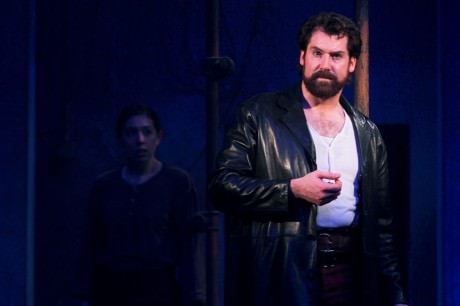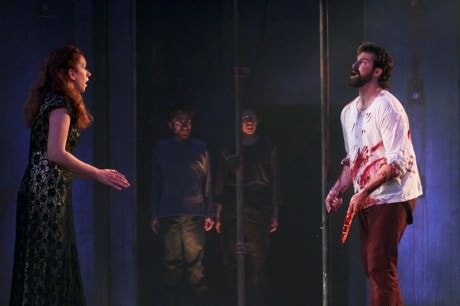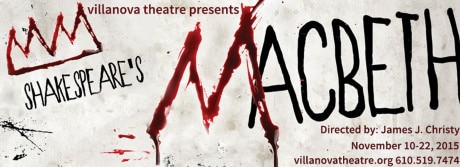More than four hundred years after Shakespeare wrote it, Macbeth remains a potent play. Its tale of how the lust for power corrupts is timeless, made even more enduring by some of the most legendary lines in English literature. It’s hard to go wrong with a classic play that just about everybody knows, even if they don’t think they know it.
But Villanova Theatre’s interpretation of “the Scottish play” is a unique one. Director James J. Christy makes a number of uncommon choices that weaken the impact of Shakespeare’s words and make the familiar story hard to follow. It’s filled with unfortunate gimmicks that turn Macbeth into a muddle.

As early as the play’s opening moments, it’s clear that something is amiss. When a trio of witches – the famous “Weird Sisters” – shows up to give a prophecy about the title character’s fate, their faces can’t be seen; the performers are wearing robes with hoods attached that completely cover their heads. We hear their words on a prerecorded tape layered with echo and clanging sound effects, but it’s all rather murky, and it mitigates the power of live performance. (It’s also hard to hear the other actors’ lines over sound designer John Stovicek’s sound effects.)
Minutes later, when Macbeth delivers his first soliloquy, something else odd happens: a woman walks into the scene a few feet behind him and, while staring at Macbeth intently, speaks part of the soliloquy along with him; she says seemingly random words from the soliloquy at roughly the same time Macbeth does. I assumed at first this woman was Lady Macbeth, and that her saying the words along with him was a way of showing the tight bond between husband and wife; but when the real Lady Macbeth made her debut in the following scene, I realized I was wrong. Then in that next scene, when a man appeared behind Lady Macbeth during her first soliloquy and repeated the previous woman’s routine, watching Lady Macbeth intently and saying certain words along with her, I realized something peculiar was going on.
This stunt was repeated during every soliloquy over the course of two and a half hours. Instead of focusing on the words and the way they were interpreted, I ended up focusing on these strange people in the background, wondering why they were there, why they were emphasizing seemingly random words, and what their presence was supposed to tell us about the minds of Macbeth and his wife. Every time these bizarre impositions appear, they dilute the power of Shakespeare’s beautiful words.
(Incidentally, when I checked my program at intermission to see who was playing these roles, I found these newly-added characters weren’t even listed on the cast list page. I paged ahead five pages to read the actors’ bios, where I eventually found that Chris Monaco plays Lennox, Porter, and “Lady Macbeth’s Shadow,” while Jess Otterbine plays Ross and “Macbeth’s Shadow.”)
Another unusual element of Christy’s production is that Macbeth is portrayed as a passive player in his partner’s plot to usurp the Scottish throne. While perhaps not the most common reading of Macbeth, this is certainly a valid interpretation. But as played by Kyle Fennie, Macbeth doesn’t seem power-hungry or ruthless at all; instead he comes across as a boisterous, jovial guy who loves hugging his pals and hanging around with his buddy Banquo (that is, at least until he has Banquo killed). He hardly seems the kind of man who would murder the King of Scotland, even with his wife urging him on. He also rushes through most of his soliloquies, not giving them enough depth.
As Lady Macbeth, Meg Trelease tends to indicate emotions through manic expressions, obvious gestures and over-enunciated dialogue. When she says “Come to my woman’s breasts,” she paws her own breasts. When she says, We shall make our griefs and clamour roar/Upon his death,” she screams the word “roar” (presumably so that we all know what a roar sounds like). However, she does do a good job late in the play during the mad scene (“Out, damned spot!”), where her agitations seem appropriate to the character.
Then there’s the oddest directorial touch of all: turning the play’s one comic relief scene – the one with the drunken porter – into a take-off on Samuel Beckett’s Waiting for Godot, complete with not one but three porters, all wearing bowler hats. If you’ve never seen Godot – and maybe even if you have – you may be stumped trying to figure out what’s going on in that scene.
Still, there is some good young talent onstage in this Macbeth. Dan Cullen is strong as Banquo, and Elizabeth Meisenzahl and Rebecca Jane Cureton excel as female versions of Macduff and Malcolm. There’s also a sweet, but far too brief, turn by Rachel O’Hanlon-Rodriguez as Macduff’s son (here called his “child”). And Susan Shaeffer’s costumes show a lot of variety, from fatigues for the soldiers to dresses for Lady Macbeth that evoke the heroines of film noir classics like Mildred Pierce and Gilda.

Jerold R. Forsyth’s lighting is sparse and largely effective, although a strobe effect in the second act led me to cover my eyes for a while. Daniel Boylen’s industrial set uses pipework as a motif: thin metal pipes, about ten feet long, stick up from the stage at several spots, while the soldiers under Macbeth’s command carry shorter versions of these pipes, using them as weapons. And while John V. Bellomo’s fight choreography is excellent, the climactic battle is fought not with swords but with pipes used as fighting sticks. I won’t spoil it to say how Macbeth meets his end, except to say that, like so many elements of this production, it’s not done in a very ‘unique’ way.
Running Time: Two hours and 30 minutes, including an intermission.
Macbeth plays through November 22, 2015 at Villanova Theatre, in Vasey Hall on the Villanova University campus – 800 Lancaster Avenue, in Villanova, PA. For tickets, call the box office at (610) 519-7474, or purchase them online.





